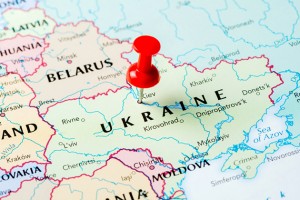When the Russian government ordered troops to effectively occupy the Crimean region of Ukraine in response to the overthrow of the pro-Moscow government in Kiev, it was all too familiar to Daniel Fata ’94 (CLAS). Fata, now vice president at the Cohen Group, a Washington, D.C.-based global consulting firm, was the Pentagon official who coordinated the U.S. response to Russia’s 2008 invasion of neighboring Georgia. Fata, who served as deputy assistant secretary of defense for European and NATO policy from September 2005 to September 2008, says that earlier crisis can offer the West important lessons about how to respond now.
Fata, who earned a bachelor’s degree in political science with honors, credits UConn – and, in particular, an Introduction to International Relations course taught by professor emeritus Fred Turner – with helping to set him on the course that brought him to a high-level public service career. During a recent visit to campus when he spoke to undergraduates and graduate students, Fata – proudly sporting a Husky necktie – had the chance to speak with UConn Today about the crisis in Ukraine.
The interview has been edited and condensed for clarity.
Q: Did the U.S. learn any lessons from Georgia that apply to the Ukraine situation?
There were a few things that we learned with Georgia that can help us understand how to navigate this current crisis. The first thing is not to believe what Moscow says. During the Georgia crisis, Moscow was saying their only intention was to protect Russian citizens and they didn’t have any intention to advance on the capital. And then when they did try to advance on Tbilisi, they said, we’re just protecting Russian citizens. What we didn’t understand was that their definition of “Russian citizens” is fairly elastic, and that their real goal was to unseat [Georgian President Mikheil] Saakashvili.
Q: What should be the goal of Western nations now that Russia has effectively taken Crimea under its umbrella?
The first goal should be to stop further Russian expansion into Ukraine or into other countries along its border. Second, we need to express solidarity with our allies in the region, which we didn’t do enough during the Georgia crisis. We need to do tangible, demonstrative things: more joint military exercises, for example. Our allies there are right at the spear’s point, and we need to do more than just talk about solidarity. Finally, we need to beware of a “Georgian back door”: while the world is focused on Ukraine, Russia could use this opportunity to finish the job in Georgia, or to expand into a different territory. Rolling back Russian gains in Ukraine should also be a goal, but that’s going to take a lot longer.
Q: There’s been a lot of speculation about the motivation of Russian President Vladimir Putin. What’s your sense of his goals?
You can go back to a conversation Putin had with my old boss, Defense Secretary Robert Gates, back in April of ’07. A couple of us joined him on that trip to Moscow, and Putin told us, you guys in the West just don’t understand how humiliated the Russian people were by the collapse of the Soviet Union and the loss of the Russian empire, compounded by the fact that the West really came in and pillaged the Russian economy in the 1990s during privatization. Putin sees his job as restoring Russian national pride.
Q: Where do you think the crisis goes from here?
Putin knows he’s already won. There’s no way to get Russia out of Crimea in the short term. He was humiliated by the overthrow of [pro-Russian Ukrainian President Viktor] Yanukovych, but now he’s saved face. I think the referendum on independence in Crimea that Russia wants will go forward, and since Crimea is about 65 percent Russian, I think it will pass. That’s when it gets interesting, since the Ukrainian government won’t recognize the results. What does Putin do then? Does he fully annex the territory? He does if his goal is to increase the tension.
Q: No one in the West seems to favor military intervention. Is there anything that can be done to exert pressure on Putin?
The West doesn’t have a lot of leverage. Canceling the G8 meeting in Sochi doesn’t matter to Putin. Visa bans might be more of an irritant, because some of those people are his power base, but I’m not sure that makes much of a difference. Outside of the U.S., the only country that matters to Putin is Germany, because of its size and influence in the European Union, and because of its economic ties to Russia. If [German Chancellor] Angela Merkel were to come out and say, ‘This is not the 19th century. This is not how we practice statecraft in the 21st century’ and back that up by announcing a plan to diversify away from Russian sources of energy, that would be a big blow to the Russian economy. But even if Merkel does that, the status quo for the time being is de facto Russian control of Crimea. The struggle here is really about avoiding de jure Russian control.




